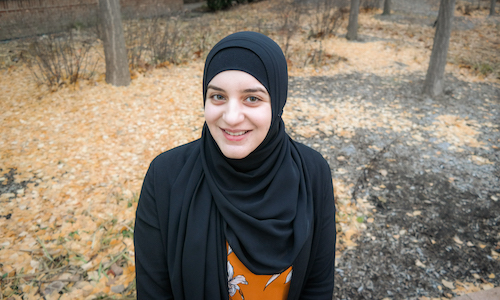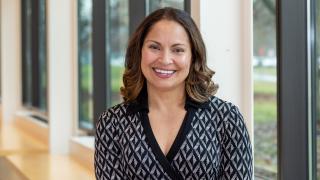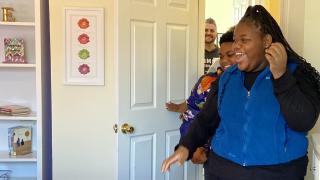
Naideen Charara traces her natural affinity for teaching English-as-a-second language (ESL) students to an experience she had well before she ever thought of becoming a teacher. She was 10 years old when her mom and dad decided to move the family to Lebanon to immerse the family in the culture and religion. It was an exciting adventure, but the move posed certain challenges for an American kid who’d never lived outside of Michigan. While Charara spoke Arabic, she didn’t read or write it so well, and school was a daily struggle that often left her feeling “like an outsider.” Moreover, just a few weeks after they moved, an armed conflict broke out, leading to periodic mandatory evacuations of their town near the Israeli-Palestinian border.
The family returned to Michigan after only a year and a half, but Charara says she’s still discovering ways the experience left its mark on her. For example, while doing an early practicum in her education program, she found herself easily relating to a 5-year-old girl who’d recently fled the fighting in Syria. “It was clear she had experienced some major trauma,” Charara explains. “If a door shut or there were any loud noises, she would jump. And I felt like it was a blessing that I was there to work with her, because I could understand her in ways that other people couldn’t. I remember the bombs going off and what that felt like. And I think that’s the moment I felt solid about this being what I really want to do — to help the kids who felt like outsiders. More than anything, they need a safe space, and I realized my classroom could become that for them.”
Managing a class with many ESL students can be a challenging assignment, particularly when it comes to promoting the kind of inclusion that Charara values. She says a lot of people have a misconception that ESL classrooms are non-English classrooms; that is, the students are all English learners and the instruction happens in the students’ native language. In reality, it’s far more typical for an ESL classroom to include all kinds of learners — from kids who don’t speak or understand any English, to fluent native English speakers, to everyone in between. And almost all the instruction happens in English.
That kind of environment demands that ESL teachers be especially sensitive to leaving students on the sidelines. Charara says there are all kinds of methods for doing this, and she’s developed some favorites from her recent student teaching experience. For example, maintaining classroom routines can be extra helpful for kids who know very little English, because the repetition allows them to quickly pick up the meaning of words they hear every day. She also structures small groups to include learners of varying levels, so classmates are forced to step up and help each other. Sometimes, she also briefly switches to speaking in Arabic, especially for students who know little or no English. Importantly, however, she says even that “code switching” benefits the classroom as a whole. “When you start speaking in a language that the English speakers don't understand, it gives them a taste of what their ESL classmates feel everyday. That’s a natural way to build understanding and solidarity among classmates.”
At Saturday’s commencement, Charara will officially earn her teaching degree, but she’s already well into her job search. In fact, she’s received offers from both traditional public and charter schools in Dearborn, which would give her an immediate opportunity to lead an ESL classroom. To the surprise of some friends and family, however, she hasn’t accepted any of the offers.
“I used to think my dream would be to teach in Dearborn public,” she says. “But now I think maybe I should get out of Dearborn. It’s true — there’s a big population of ESL students here, but there are also so many teachers meeting that need and that’s not the case in other districts. Teaching is something that you do for the kids. And I believe that wherever I’m most needed is where I’ll feel like I belong.”
###
One other cool fact about Naideen Charara: In an era where teachers increasingly have summer jobs and side hustles, Charara already has hers lined up. Since freshman year, she’s run her own calligraphy business. Check out her work on Instagram.






